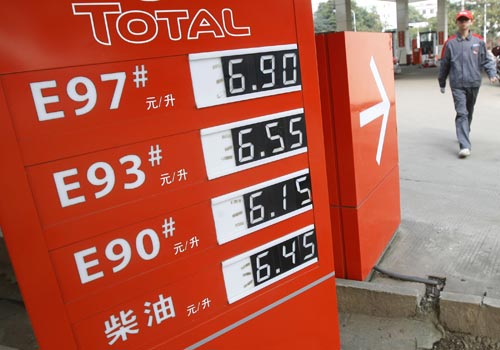Photos
Oil pricing proposal put on hold as inflationary pressures bite
Updated: 2010-12-04 09:42
By Liu Yiyu (China Daily)
BEIJING - A proposal to adjust China's refined oil products pricing system is likely to be put on the back burner until early next year, as the country fights inflationary pressures, the National Business Daily reported Thursday, citing unnamed sources.
 |
|
A signboard shows gasoline prices at a Sinochem Total filling station in Wuhan, Hubei province. A proposal to adjust China's refined oil products pricing system is likely to be put on the back burner until early next year. [Photo/China Daily] |
The proposal has been submitted to the State Council, China's cabinet, for final approval, according to those sources.
Under the new regime, price adjustment will be based on a shorter period of 14 days or 10 days, rather than the current 22 day period, the source said.
The proposal, which was slated for release by the end of the year, will be postponed until early next year due to the current inflation pressure, the unnamed sources said.
China's top economic planning body, the National Development and Reform Commission (NDRC), said in October that a new pricing mechanism for refined oil products is expected to be finalized by the end of the year.
The new regime will be more flexible in reflecting market changes and reducing price manipulation, and will eventually develop into a market-oriented mechanism, the NDRC said earlier.
Under the 2009 pricing mechanism, the government considers adjusting domestic refined oil prices when international prices change more than 4 percent within 22 working days.
Under the current system, China adjusted fuel prices three times this year, with two price hikes and one reduction.
The latest adjustment came in October when gasoline and diesel retail prices rose by around 3 percent.
| ||||
When international crude prices are on the rise, China's diesel wholesale prices are higher than retail prices, forcing private refineries to suspend production to avoid losses.
Analysts said that price hikes are synchronized with the rise in international crude prices, but price cuts are always delayed.
Lin Boqiang, director of the China Center for Energy Economic Research at Xiamen University, said: "China should further upgrade the current mechanism to allow the market to play a greater role in determining oil prices."
Meanwhile, data from the National Bureau of Statistics showed that the Consumer Price Index, the leading gauge of inflation, rose to a 25-month high of 4.4 percent in October, indicating higher inflationary pressure.
For the 9th time in 5 days, China's top economic planner announced on Thursday that it will take additional measures to stabilize commodity prices.
The NDRC said six regulatory groups will be sent to 18 provinces and municipalities to inspect commodity prices, focusing on cotton and refined oil.
E-paper

Ear We Go
China and the world set to embrace the merciful, peaceful year of rabbit
Preview of the coming issue
Carrefour finds the going tough in China
Maid to Order
Specials

Mysteries written in blood
Historical records and Caucasian features of locals suggest link with Roman Empire.

Winning Charm
Coastal Yantai banks on little things that matter to grow

New rules to hit property market
The State Council launched a new round of measures to rein in property prices.




